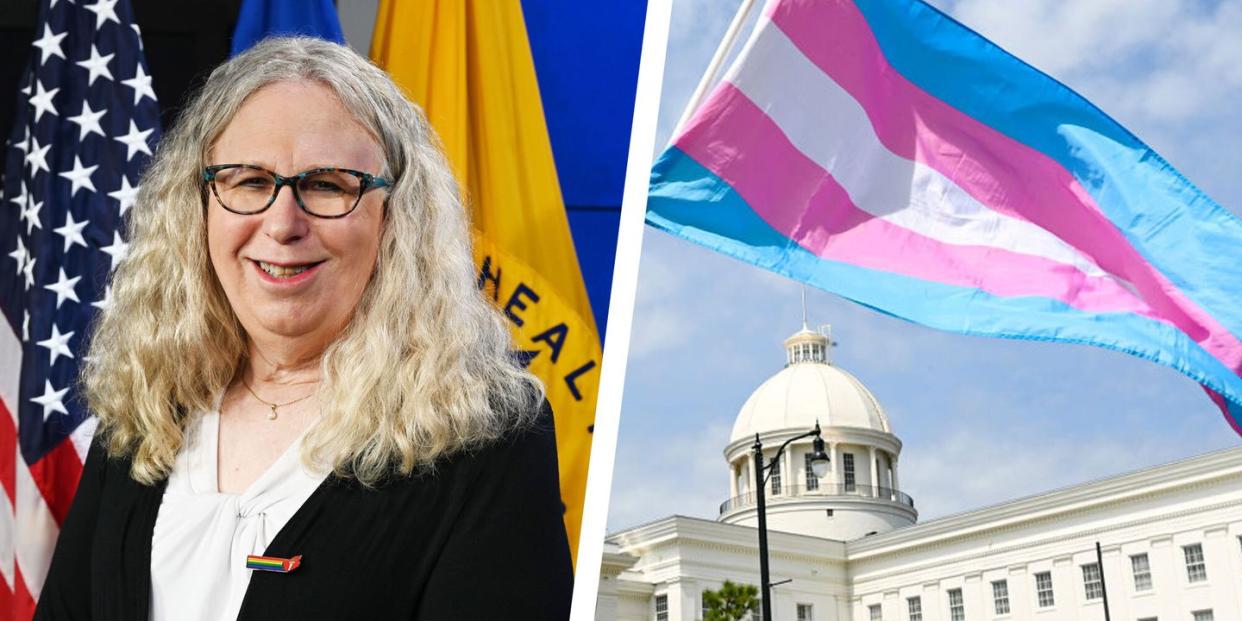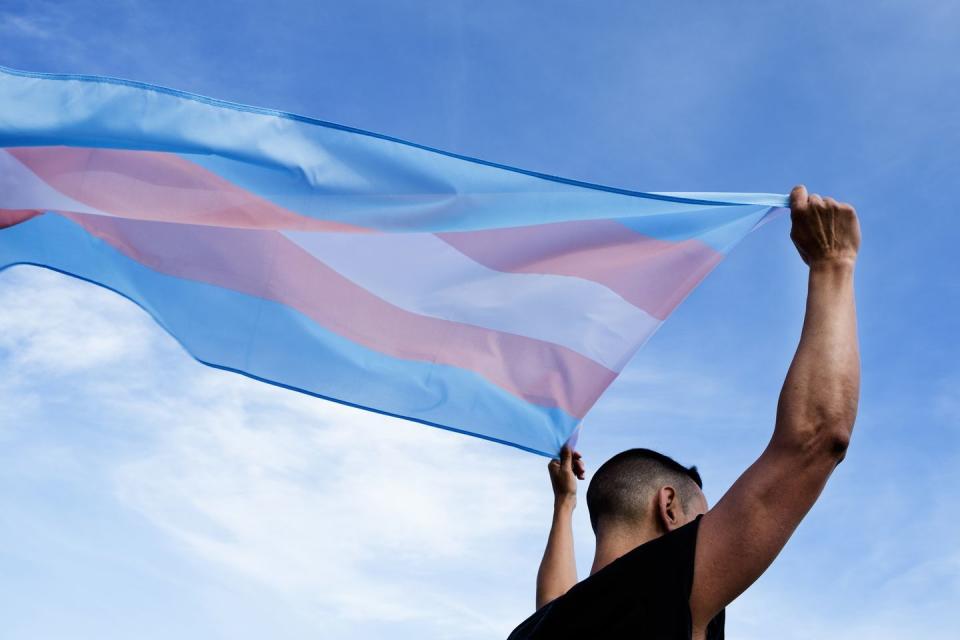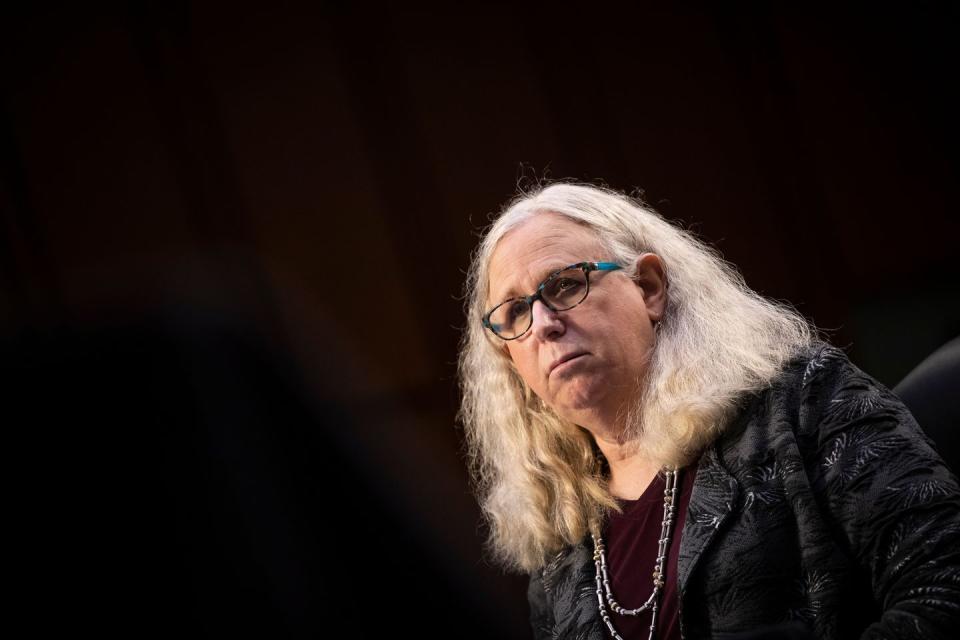The Trans Community Is Under Attack, and We All Need to Fight Back

- Oops!Something went wrong.Please try again later.
- Oops!Something went wrong.Please try again later.
Dr. Rachel Levine made history on March 24 when she was confirmed by the Senate in a bipartisan vote to be the Assistant Secretary for Health (ASH). She is the first and only openly transgender person to hold an office that requires Senate confirmation. Before her time as ASH, she served as the Pennsylvania physician general from 2015 to 2017 and then as secretary of the Pennsylvania Department of Health from 2017 to 2021.
Following her confirmation, Levine released a statement where she spoke directly to the LGBTQ community: "First, thank you. Only through your work and advocacy over many decades is my story possible. I am humbled to be the first transgender individual to serve in a Senate-confirmed position," she said. "When I assume this position, I will stand on the shoulders of those who came before—people we know throughout history and those whose names we will never know because they were forced to live and work in the shadows."
Men's Health talked to Levine ahead of the first Pride Month under President Joe Biden, and amid ongoing pushes for discriminatory anti-trans legislation in various parts of the country. This interview has been edited and condensed for clarity.
This is the first Pride Month under the new administration. What is it going to look like?
Rachel Levine: I think that the future looks brighter than ever right now. As we enter Pride Month, we are working to advocate and advance policies not just at the Department of Health and Human Services, but across the administration that ensure health equity and equality for everyone—and that includes us in the LGBTQ community. There's a lot of systemic changes that we have to make. There have been a lot of things that were difficult about the previous administration that we have to work on and change. But it is critical that we have a president that supports our community.
When [President Biden] said in his Joint Address to Congress, "To all the transgender Americans watching at home—especially the young people, who are so brave—I want you to know that your president has your back,"—I mean, that's never been said before. So it's a tremendously exciting time, and it's exciting for me. I'm the Assistant Secretary for Health, at the Department of Health and Human Services. I'm honored to have been nominated by president Biden to have been confirmed in a bipartisan vote by the Senate. I know what it symbolizes for the LGBTQ and particularly for the transgender community, and that humbles me. The Vice President said, “While I may be the first woman in this office, I will not be the last”—and that's the way I feel, too. There will be other Senate-confirmed transgender individuals after me, and it's great to blaze the trail.
What are things that allies can do to better support the trans community?
I think that trans rights are human rights. It's important for everyone—all of our allies—to recognize that and to support the trans community. And it's critical to advocate locally—within a community, a school district, a business—to make sure that they have non-discrimination policies that include sexual orientation and gender. Pennsylvania, where I'm from, is actually the only state in the Northeast that does not have a statewide non-discrimination policy, and that's not acceptable. Then, of course, an individual can add gender pronouns to their email signature or virtual meeting rooms, which shows people that they're aware of these issues about gender identity.

How can other cisgender members of the LGBTQ community step up to support their trans brothers and sisters?
What COVID-19 has taught us is that we are all interconnected. And I think that that's true of the LGBTQ community. We have to support each other to build a better future for all of us. I think that we need to educate ourselves about other people. You know, it's not just the LGBTQ community, it's the LGBTQQIAAP+ [Lesbian, Gay, Bisexual, Transgender, Queer, Questioning, Intersex, Asexual, Ally, Pansexual] community. I think that we have to educate ourselves about everyone under the rainbow umbrella. We have to understand each other. We have to listen to each other, and we have to stand united. That's how we will make more progress in terms of equality and health equity.
Can you speak to why access to healthcare is so crucial for trans/nonbinary individuals?
Everybody needs access to healthcare. Healthcare is a right. So we have to work on healthcare disparities that exist. That includes sexual and gender minorities but there are many healthcare disparities that exist for the African-American community, the Hispanic community, American Indians, and Native Alaskan communities. But in terms of sexual and gender minorities, if members of our community don't feel that they will be accepted, then they won't get healthcare. Many, many LGBTQ people have faced discrimination and harassment in the healthcare community.
So they don't seek care or avoid and postpone care, which has significant negative health consequences. That is why it's so important that the administration and Health and Human Services are reinterpreting section 1557 of the Affordable Care Act [which prohibits discrimination on the basis of race, color, national origin, sex—including sexual orientation and gender identity—age, or disability in covered health programs or activities].
No one should be discriminated against when seeking healthcare because of who they are and who they love. You know, I'm a pediatrician and adolescent medicine specialist, and this is very true for children as well.

Speaking of children, we’re seeing a rise in banning transgender youth from participating in sports.
Yes, it's really challenging that there are states and public officials that are subjecting trans kids to this type of stress, harassment, and discrimination. Trans kids are very vulnerable and they get bullied in school. They face lots of different challenges and they need our support in their journey, with who they are, and all other aspects. So it's difficult that there are laws that try to prohibit them from participating in sports. And there are well-accepted guidelines about how trans kids can participate in sports. In Arkansas and some other states, there are some laws limiting their access to trans-affirming medical care. This is unacceptable. To me, it is political. This is a wedge issue, and it's directly impacting and threatening trans youth.
Corporations love to act like they care about queer people once a year in order to make sure you give them money. What are some authentic ways that corporations can support the queer community?
What companies need to do is to make sure they look internally. They look at their human resources department, and they look at their policies and workplace culture to support LGBTQ employees. And it’s critical they have non-discrimination policies that include sexual orientation as well as gender identity and expression.

Where do you see that we, as a country, are making the most progress on LGBTQ issues?
I'm a positive and optimistic person, and I think that under the Biden-Harris administration, we have already made progress, and we will continue to make progress. From my perspective, as the Assistant Secretary for Health, health equity, in general, is on my portfolio. That includes health equity for LGBTQ issues. So, we're going to revive and expand the Health and Human Services Health Disparities Council. We've already made an important policy change in terms of section 1557 of the Affordable Care Act. But just because we say it doesn't mean it's all done. We have to work on making sure that policy changes get implemented. So there's a lot of work to do.
You have a huge job ahead of you. How do you stay energized for it?
I help people. That's what I try to do. I saw patients, primarily teenagers, and helped them. I educated students and residents and staff to help families. I did clinical research about new ways to help teens and then administratively developed programs to do that. Then I went into public service in Pennsylvania as the Physician General and the Secretary of Health. From there, I tried to help people from a public health perspective. Now as the Assistant Secretary for Health, I'm trying to do that nationally. And so that is really my core motivation: helping people. That is how I stay energized.
This interview has been lightly edited for space and clarity.
You Might Also Like

